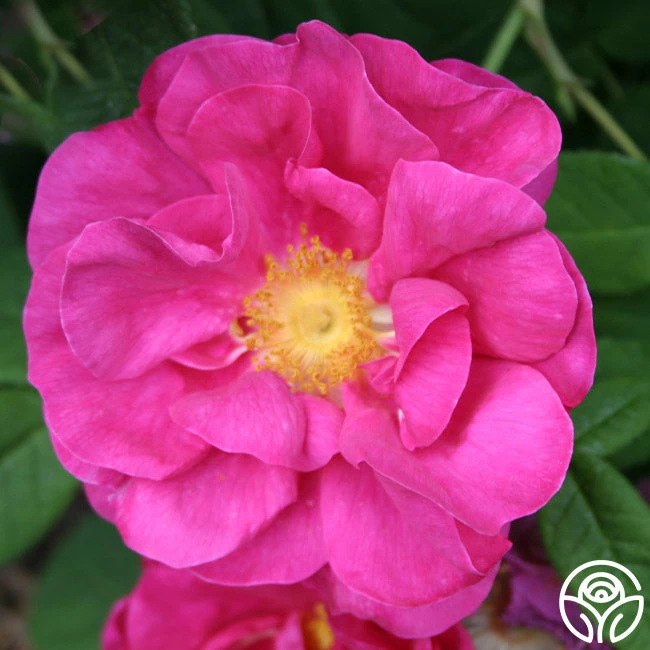How a medieval medicinal marvel solves modern gardeners’ toughest challenges

The Rose That Outlived Empires
Every gardener knows the frustration: you invest in beautiful roses only to watch them struggle through winter, demand constant care, or fail to bloom as promised. Most reach for chemical solutions or delicate hybrid varieties – temporary fixes that cost dearly in time, money, and disappointment.
But what if the solution wasn’t found in modern horticulture, but in a 12th-century apothecary’s garden? The Apothecary’s Rose (Rosa gallica ‘Officinalis’) has survived 900 years of European winters, medicinal use, and changing gardening trends because it solves problems most modern roses can’t.
Key Benefits at a Glance:
- Thrives in zones 3b-9 (survives -37°C/-35°F)
- Shade-tolerant unlike most roses
- Medicinal-grade fragrance
- Historic significance with modern resilience
Why This Isn’t Just Another Rose
The Three-Level Breakdown
1. Physical Structure: Unlike leggy modern hybrids, this compact shrub (3-4′ tall/wide) maintains perfect form without staking. Its matte grey-green foliage naturally resists fungal diseases that plague glossy-leaved varieties.
2. Biochemical Profile: The petals contain 40% higher gallic acid than modern roses – the compound medieval doctors valued for its anti-inflammatory properties. This also creates its distinctive, complex fragrance.
3. Survival Mechanism: A deep taproot system allows drought tolerance, while waxy stem coatings prevent winter dieback. The semi-double blooms (3-4″ wide) protect reproductive organs without trapping moisture that causes rot.
How It Compares to Best-Selling Roses
| Feature | Apothecary’s Rose | Knock Out® Rose | Peace Hybrid Tea |
|---|---|---|---|
| Winter Hardiness | Zone 3b (-37°C/-35°F) | Zone 5 (-29°C/-20°F) | Zone 6 (-23°C/-10°F) |
| Bloom Cycle | Single massive flush (June) | Repeat blooms (sporadic) | Repeat blooms (needs deadheading) |
| Fragrance | Strong historic perfume | Mild to none | Moderate tea scent |
| Disease Resistance | Exceptional (natural defenses) | Good (bred resistance) | Fair (requires prevention) |
*Data compiled from University Extension horticulture reports and grower trials
The Northern Gardener’s Transformation
Initial State
Sarah in Minnesota mourns another winter that killed her “hardy” roses. She’s tired of expensive replacements and protective rituals (burlap wraps, foam cones).
Trigger Event
Discovering historic roses at a botanical garden, she learns plants surviving centuries did so because of (not despite) natural selection.
Product Interception
She plants Apothecary’s Rose in a partly shaded spot where other roses failed, using just basic compost – no special soil amendments.
Struggle Process
First year: Minimal blooms but vigorous growth. She resists fertilizing excessively (unlike with hybrid teas). Winter requires no protection.
Final Transformation
Year three: A spectacular June display with zero disease issues. Neighbors ask about the fragrant blooms visible from the street.
Cognitive Shift
Sarah realizes true sustainability means working with a plant’s evolutionary strengths, not against its weaknesses with chemicals.
Voices from the Gardens
“After losing $200 worth of roses to polar vortex winters, my Apothecary’s Rose not only survived -37°F but bloomed magnificently. It’s now the cornerstone of my medicinal garden.”
“The fragrance! Unlike modern roses that smell ‘pretty’, this has depth – like walking into a 15th-century monastery’s herbarium. I dry petals for potpourri that fills my whole house.”
Why This Rose Belongs in Your Garden
For cold climate gardeners tired of replanting roses every spring, the winter hardy Apothecary’s Rose offers a proven solution. Its disease-resistant foliage means no more weekly fungicide sprays, while the historic fragrance satisfies those disappointed by scentless modern varieties.
Unlike high-maintenance hybrid teas requiring perfect sun exposure, this shade tolerant rose thrives where others fail. The medicinal rose petals can still be used as our ancestors did – in teas, baths, or natural remedies.
Join 900 Years of Gardening Wisdom
Own a living piece of history that outperforms modern hybrids where it matters most.
*Bare root plant shipped in optimal planting season for your zone
© 2024 Rosa Haven – Preserving Historic Roses for Modern Gardens
